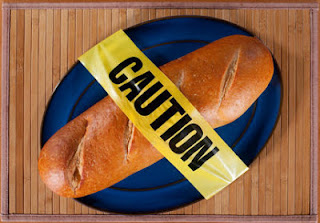Drug Induced Nutritional Deficiencies and Gluten Sensitivity
Often times, persons with gluten sensitivity are chronically ill and are prescribed medications for their symptoms.
People with gluten sensitivity are already nutrient deficient (see Hallert et al http://www.ncbi.nlm.nih.gov/pubmed/12144584) and without knowing it can get into more nutrient deficiencies when they go on most medications. Drug induced nutrient loss is rarely discussed when a prescription is ordered except for perhaps when diuretics are ordered, some potassium may be ordered to counter act potassium loss. But many drugs are metabolized by using up various nutrients and that leaves a person short for their day to day metabolism. The nutrient deficiencies themselves cause symptoms or delay healing. By knowing what nutrients are depleted a person can make up the difference with food and supplements.
I take nutrient loss from drugs very seriously. For example, one year of using a PPI drug for heart burn, like Prepulsid, can increase a persons risk of heart attack by 30%. This is due to the massive calcium and magnesium losses.
For many years now, as a resource, I've used a handbook written by Ross Pelton and James Lavalle called "The Nutritional Cost of Prescription Drugs" published by Morton Publishing Co., 2nd
Ed., 2004.
The authors make many helpful observations and recommendations. Here is a quote from the book-
Symptoms of folic acid deficiency include elevated homocysteine, anemia, headaches, fatigue, depression, hair loss, insomnia and increased susceptibility to infection.
Again, there are medical ironies here. Folic acid is helpful in relieving arthritic pain, but the drugs commonly prescribed for arthritis deplete folic acid. The cells of the intestinal lining have a special need for folic acid because of their high rate of replication; sulfasalazine, a drug commonly prescribed for colitis, can cause a deficiency of folic acid, ultimately delaying healing.
It is likely that thousands of premature deaths of heart disease and stroke could be prevented through adequate supplementation with folic acid. Some multivitamins and B-complex vitamins include only 100 mcg of folic acid; 400 mcg is a better level, and there is much to be said for using even more than that. It is a tragedy that this very inexpensive and non-toxic vitamin is not more widely used-especially by those who need it the most, including millions of users of anti-inflammatory drugs and oral contraceptives.
If you are on any medication and would like to know what nutrients are depleted, there are charts on the internet. I would not rely only on these charts or the one I have a link to here:
http://www.northlandak.com/Drug-Induced_Nutrient_Depletions_TM-1.pdf.
Merry Christmas and Happy New Year
Dr. B





